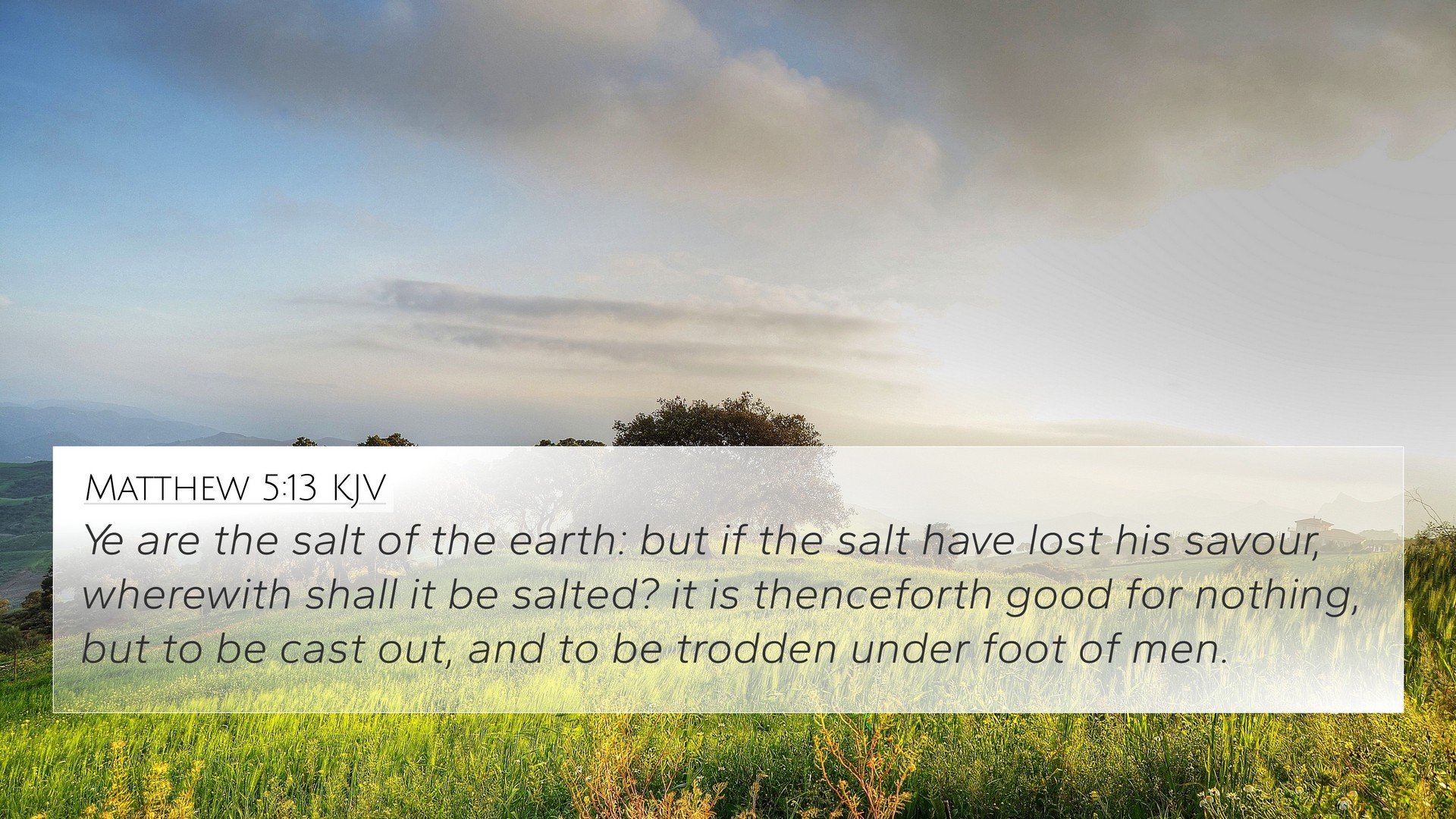Bible Verse Meaning: Matthew 5:13
Matthew 5:13 states: "You are the salt of the earth; but if the salt has lost its savor, how shall it be seasoned? It is then good for nothing, but to be cast out and to be trodden under foot of men."
Understanding the Verse
This verse forms part of the Sermon on the Mount, where Jesus addresses His followers, illustrating their role and influence in the world.
Notably, the metaphor of salt carries deep theological implications regarding purity, preservation, and flavor.
Commentary Insights
Matthew Henry's Commentary
Matthew Henry emphasizes the importance of Christians as agents of preservation in a morally decaying world.
He notes that just like salt preserves food from decay, believers are to act as a moral and spiritual preservative in society.
If believers lose their saltiness—meaning their effectiveness and distinctiveness—they become worthless as influence and testimony.
Albert Barnes' Notes
Albert Barnes provides a deeper dive into the functionality of salt at the time of Jesus, underscoring its role in enhancing flavor and preventing spoilage.
He connects this to the Christian duty to infuse life with righteousness and maintain godly influence.
He warns that losing one's saltiness indicates a failure in spiritual integrity and commitment.
Adam Clarke's Commentary
Adam Clarke elaborates on the quality of salt, focusing on how without its properties it loses its purpose.
He articulates that this metaphor pertains to the preservation of values and morals.
Clarke underscores the consequences faced by believers when they fail to fulfill their divine calling, leading to a lack of spiritual effectiveness.
Cross-References
To enhance the understanding of Matthew 5:13, we can explore its biblical connections through cross-references:
- Luke 14:34-35: Jesus reflects on the necessity of salt and its flavor, affirming similar themes of usefulness and influence.
- Colossians 4:6: This verse encourages believers to let their speech be always seasoned with salt, highlighting the importance of impacting others positively.
- Mark 9:50: Here, Jesus mentions salt again, noting that it is good, implying its inherent quality and necessity in the believer’s life.
- Matthew 5:14: The following verse progresses to liken believers to light, expanding the understanding of their visual influence in the world.
- Job 6:6: This verse contextualizes the unique taste and role of salt, correlating its quality with spiritual strength.
- Ezekiel 16:4: The use of salt signifies covenant and preservation, linking to the broader themes of divine protection.
- Philippians 2:15: Paul speaks to believers being blameless and shining as lights in a crooked generation, resonating with the metaphor of salt.
- Exodus 30:35: The usage of salt in the sacred offerings denotes the importance of purity—reflective of the believer's life.
- Matthew 7:17-20: The theme of fruitfulness and authenticity aligns with the qualities of salt, underscoring the importance of a true witness.
- James 3:12: This passage discusses the source of sweet and bitter fruit, further stressing the theme of the believer's integrity and impact.
Thematic Connections
The insights from Matthew 5:13 closely connect with various themes throughout the Scripture:
- Preservation: Like salt, believers are tasked to preserve moral truth.
- Influence: The need for Christians to positively influence their environment is a continual biblical theme.
- Identity: Followers of Christ are called to maintain their identity amidst societal corruption - a recapitulation of the importance of being 'salt.'
- Responsibility: This verse establishes an expectation for spiritual responsibility in the believer's life.
Practical Application
Understanding Matthew 5:13 calls Christians to reflect on their influence in the world.
Just as salt has a distinct property that sets it apart, believers are encouraged to stand firm in their faith, embodying righteousness and truth in both word and deed.
Believers can apply this verse by actively seeking ways to enhance the lives of those around them, ensuring their testimonies remain flavorful and impactful.
Conclusion
Matthew 5:13 serves as a profound reminder of the role of believers in the world.
Through the commentaries of Matthew Henry, Albert Barnes, and Adam Clarke, we gain a rich understanding of how Jesus calls us to be the 'salt of the earth.'
This verse acts as an invitation to actively engage in cross-referencing biblical texts and thematic connections, deepening our study and interpretation of Scripture.








